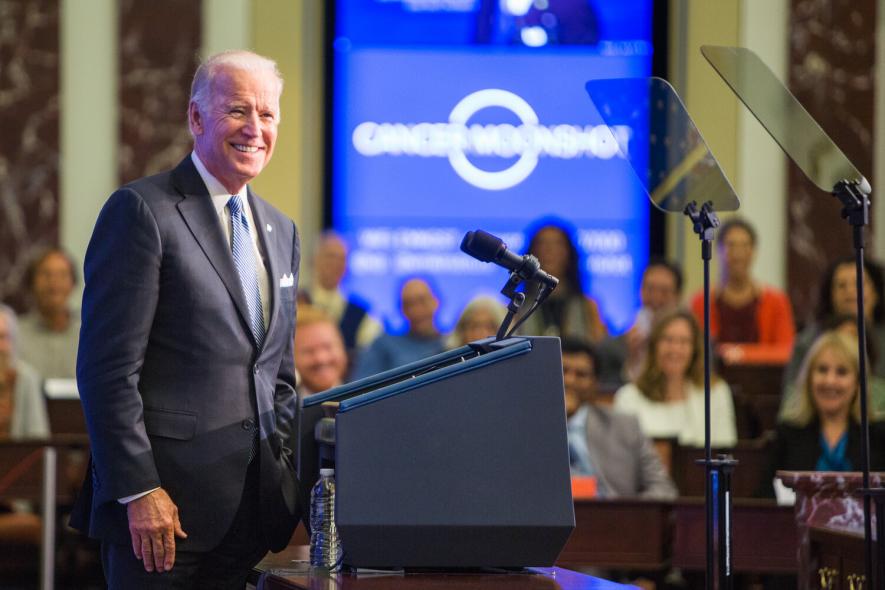
BENZONIA — One of the oddities of the 2020 presidential election is how Joe Biden’s smashing victory was greeted by such discouraged enthusiasm by his supporters. You’ve heard it. Democrats lost seats in the House. Republicans hung on to seats polls predicted they would lose in the Senate. Though Trump was soundly defeated, too many Biden supporters worry that he will somehow retain relevancy.
Well, as Joe Biden would say, here’s the deal. Biden walloped Trump. The latest tally shows Biden won over 81 million votes, 6 million more than Trump. Compared to the 2016 tally, over 26 million more votes were cast for the two major party presidential candidates in 2020. Biden won 15 million of them; Trump won 11 million.
Dig a little deeper into the numbers and recognize how Joe Biden and Kamala Harris changed the electoral map. The Biden-Harris ticket rebuilt the Blue Wall in the Great Lakes states, established Georgia as a coming Blue state, and added Arizona to the Blue Wall that Democrats are establishing in the Southwest. For the first time since 1940, Democrats occupy all the Senate seats in Colorado, New Mexico, Arizona, and Nevada. And for the first time since the Depression Democrats hold those Southwest Senate seats and the presidency.
Lastly, Biden beat a stubbornly popular incumbent without the help of a third party candidate. How important is that? You’ll recall that Bill Clinton, the last Democrat to beat an incumbent, would have lost to President George H.W. Bush in 1992 without the nearly 20 million votes that Ross Perot earned with his third party campaign.
So quit all that hand wringing and uncertainty about Joe Biden. He and Kamala Harris managed an excellent campaign. His transition is founded on the same virtues of personal decency and principles of sturdy government that won Biden the presidency.
Biden’s election ensures that changes in public health, safety, the economy, justice and the environment will come faster than the media and the skeptics anticipate. Why? Because while Trump thoroughly dominated the arena of risky impulse and dangerous lies, a second arena lay alongside. Within its walls, which bind economic imperatives to ecological urgency, lie new ideas and operating practices that have been waiting to be unleashed
Watch the new era unfold.
The pandemic will end next year. The United States, at President Joe Biden’s direction, will join the league of nations working to curb carbon emissions. The U.S. will marshal the might of its national research treasury, the skills of its engineers, and the intelligence of its scientists to compete with Asia and Europe to command the jobs and investments in the largest industries of the century: carbon-free electrical generation, smart transmission, electric transportation, clean fuels, and water and soil-conserving farm production.
Commanding those industrial sectors not only promises huge economic returns, they also have signal political consequences. They open career and financial opportunities for America’s rural residents.
Biden is ready to take a second seminal step to promote the industries of this century by making skills training and college free, and forgiving existing student debt. He wants to make it easier for young people to succeed. A vocational certificate or college degree should be a passport to get ahead, not an oppressive financial burden that leaves people behind. Biden is intent on providing people with more access to good jobs and adequate incomes.
The 2020 election, more than a repudiation of Trump, also was a decision by the American majority to make the country much more relevant. Consider the opportunities in electric vehicles. The Trump administration cared not a whit about electric cars and trucks. The president’s goal was to achieve “American energy dominance” for bigger fossil-fueled vehicles, and to strip tailpipe emissions and fuel mileage standards to produce more air pollution.
But the car, truck, and micromobility (bikes, carts, scooters, etc.) markets of the future are electric, not gas and diesel. Electric motors have many fewer parts, produce little heat, last longer, are cheaper to build, and much cheaper to maintain. Battery technology is improving so swiftly that electric cars now have 250-mile to 316-mile ranges, and will soon exceed 400 miles on a single fast charge that takes 20 minutes or less.
In 2011, 17,345 electric vehicles were sold in the U.S. and just two models were available. This year over 320,000 electric vehicles will be sold in the U.S.and 55 models are available. If the growth in sales continues at anywhere near the same rate, by the end of the decade half the vehicles sold in America will be electric.
The condition of the U.S. fossil energy sector is a prime example of what awaits an industry that fails to heed market signals. Coal production this year, according to the Energy Information Administration, will total 521 million tons, the lowest in 56 years. Coal now accounts for 20 percent of U.S. electricity production, almost identical to production from renewable generation. In 2006, U.S. coal production was nearly 1.2 billion tons and fueled over half of the country’s electricity.
The triple whammy of climate change, electrified transportation, and disruption caused by the pandemic also are bludgeoning the oil and gas industry. Production and prices are declining. So is the value of fossil energy reserves underground. Since December 2019, when Chevron wrote down $11 billion in the value of its gas and oil reserves, Exxon Mobil, Shell, and BP have written down $60 billion more as once valuable gas and oil fields are becoming never-to-be-developed stranded assets.
The diminishing values, and plubic activism about the fate of the planet, have made it easier for investors to pull away from the industry. Bank of America this week became the last major U.S. financial institution to announce it will not finance exploration or production activities in the Arctic. Morgan Stanley, Citigroup, JPMorgan Chase, Wells Fargo, and Goldman Sachs had already done the same thing. The disinvestment campaign, led by U.S. environmental groups, means that President Trump’s gambit to open the Arctic National Wildlife Refuge to gas and oil exploration will likely land in the same “forget-about-it” folder where his dead end proposal to drill off the Pacific and Atlantic coasts has collected dust for nearly three years.
What we’re talking about here is big changes afoot in our well-being and our cultural mood. Here in Michigan, where I’ve been since 1990, you can feel the relief and optimism. On Election Day, by a 700-vote margin, Benzie County residents voted to increase their property taxes to finance construction of a $19 million elementary school, and $20 million more to renovate existing schools. Three earlier school funding referendums had failed.
A recent public opinion poll in Michigan found conservative rural landowners overwhelmingly support installation of wind and solar energy stations. Farmers, in particular, are enthusiastic about the annual leasing fees they receive from renewable energy generators. So are rural township officials.
Township administrators in Gratiot County, a mid-Michigan region that has experienced extensive wind energy construction, told journalist Peter Sinclair that added property tax revenue has aided local schools, emergency services, and in some cases, reduced residential property taxes.
I’m not alone in articulating how the election portends a new era of real progress. I’m aware of unmistakable signals of change.
It’s just like 2009. You remember how days before President Obama was inaugurated in January that year that Chesley Sullenberger landed a US Airways jet in the Hudson River? Rescued passengers barely got their pant legs wet. That event seemed to capture perfectly the civil, decent, effective, scandal-free presidency that followed.
Something courageous and equally noteworthy just occurred here in Michigan. Ten days after Election Day Governor Gretchen Whitmer ordered Enbridge Inc., a Canadian company, to shut down its 67-year-old Line 5 oil pipeline that crosses from Michigan’s Upper to Lower Peninsula at the bottom of the Straits of Mackinac. The Democratic governor’s decision follows seven years of public activism, all of it aimed at the Republican administration of former Governor Rick Snyder. Snyder gave ground, but not in any way that really threatened the pipeline’s operation.
Gov. Whitmer and Democratic Attorney General Dana Nessel vowed during their 2018 campaigns to shut down Line 5. They made good on that promise. It’s the first time an operating oil pipeline has been ordered to close in the United States. And though Enbridge will mount a vigorous defense, the law and public opinion are on the governor’s side, as are the corroding economics of transportation fuels and an old pipeline. Joe Biden, I’m quite sure, took notice.


